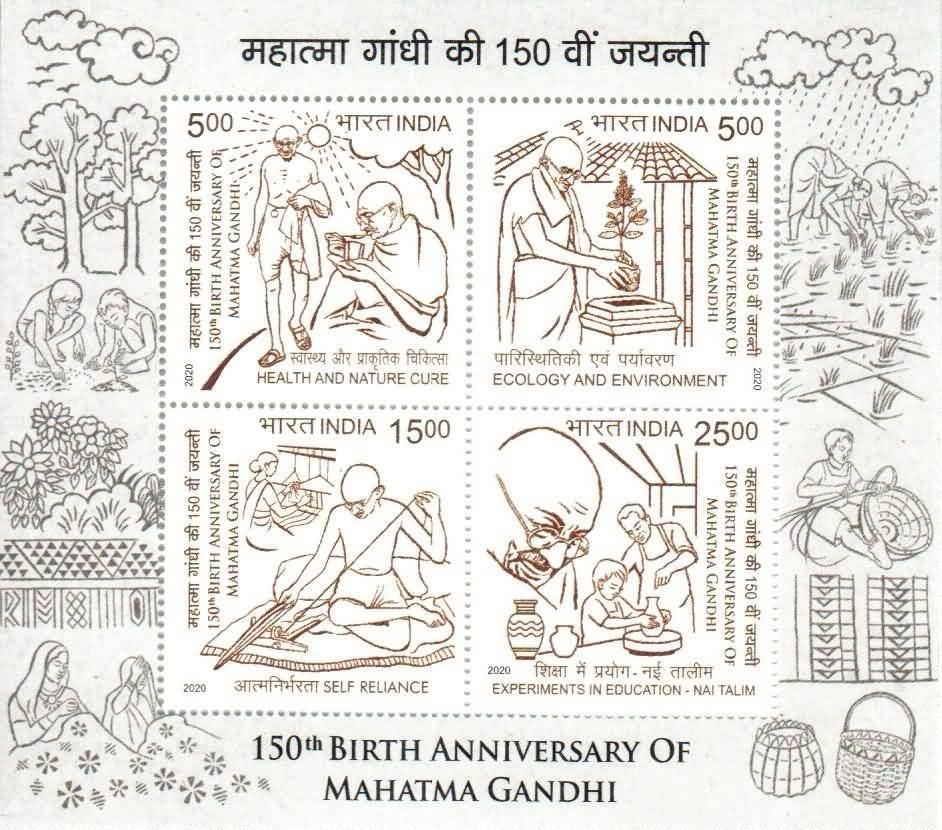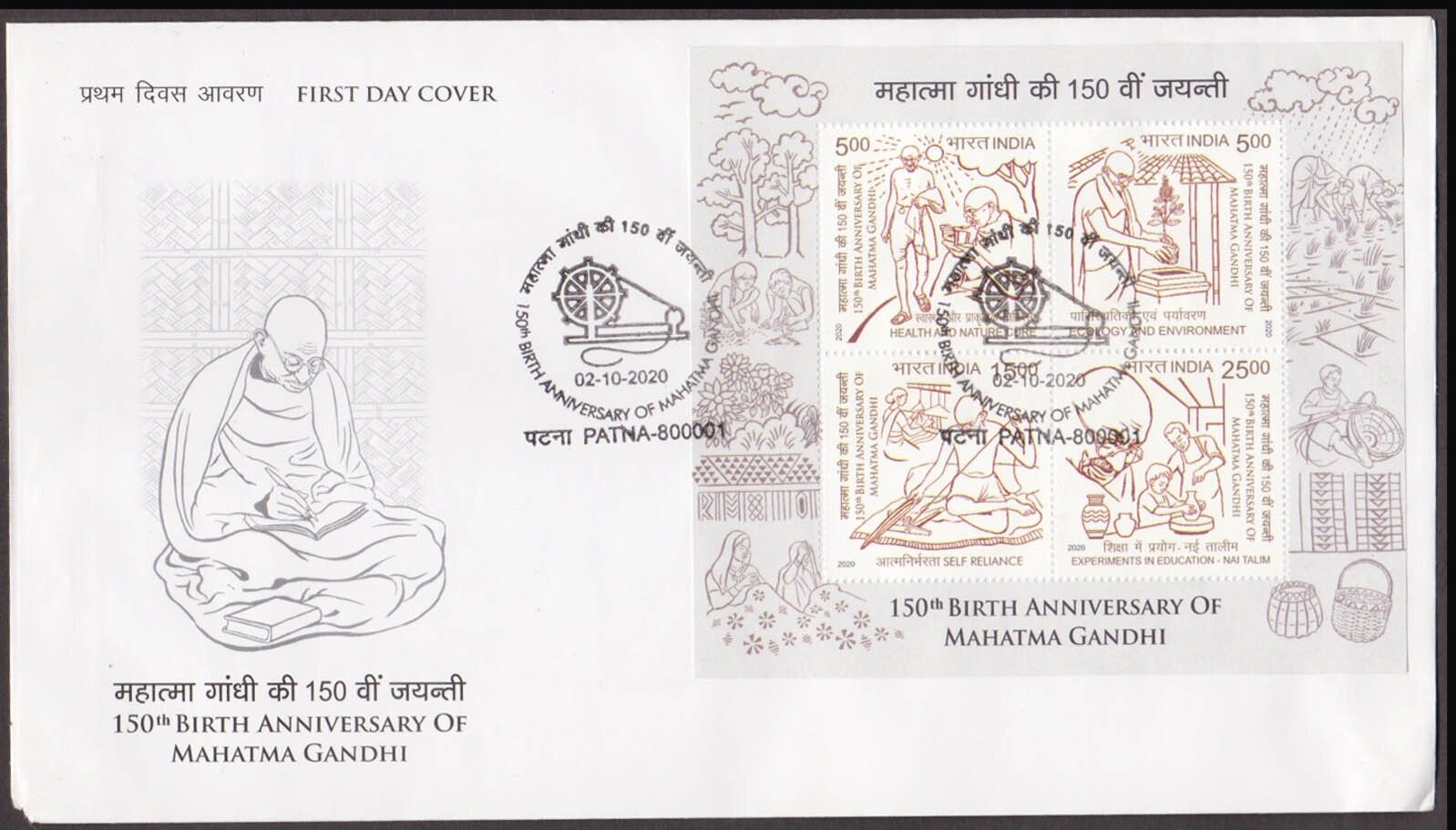150th Birth Anniversary of Mahatma Gandhi

Technical Data
| Date of Issue | October 2, 2020 |
|---|---|
| Denomination | Rs. 50 |
| Quantity | 110,000 |
| Perforation | 14 |
| Printer | Security Printing Press, Hyderabad |
| Printing Process | Wet Offset |
| Watermark | No Watermark |
| Colors | Black | Carmine |
| Credit (Designed By) | Sh. Sankha Samanta |
| Catalog Codes |
Michel IN BL232 Stamp Number IN 3239a Yvert et Tellier IN BF216 Stanley Gibbons IN MS3768 Phila-India IN 3735 |
| Themes | Anniversaries and Jubilees | Education | Environment Protection | Famous people | Healthcare | Independency Activists | Men |
Stamps in this Miniature Sheet
Mahatma Gandhi – Father of the Nation
Mahatma Gandhi (2 October 1869 – 30 January 1948), fondly known as Bapu, led India’s historic struggle against British rule and is revered as the Father of the Nation. Internationally respected for his doctrine of nonviolent resistance (Satyagraha), Gandhi demonstrated how moral force and truth could achieve political and social transformation. His lifelong struggle culminated in India’s Independence on 15 August 1947. Beyond political freedom, Bapu envisioned a just and inclusive society—free from caste, religious, economic and gender prejudices.
Relevance of Gandhian Ideals
The celebration of Gandhiji’s 150th Birth Anniversary served as a powerful reminder of the enduring relevance of his message. His principles continue to guide national policies and social initiatives, including Swachh Bharat, empowerment and rights of women and children, protection of civil liberties, welfare of farmers, and holistic development of Indian villages.
National and International Commemoration
To honour Gandhiji’s legacy, the Government of India decided to commemorate his 150th birth anniversary at both national and international levels. A National Committee, chaired by the Hon’ble President of India, was constituted with members including the Hon’ble Vice-President, Hon’ble Prime Minister, Chief Ministers of all States, political leaders, Gandhians, thinkers and eminent personalities. An Executive Committee, headed by the Hon’ble Prime Minister, was also formed to frame policies, guidelines and programmes for the commemoration.
Nature Cure and Healthy Living
Bapu made a profound contribution to the nature cure movement in India and remained a committed practitioner throughout his life. His association with Dr. Dinshaw Mehta began in 1932 and continued lifelong. In 1945, Gandhiji founded the All India Nature Cure Foundation Trust. He believed that nature cure was not merely treatment, but a transformative way of life, aligned with natural laws of health.
Environment and Ecological Balance
Gandhiji’s vision of a healthy lifestyle emphasized harmony at three levels—the intra-personal, inter-personal, and environmental/cosmic. His timeless words, “The Earth has enough resources for our need but not for our greed,” encapsulate his deep concern for ecological balance and sustainable living, warning against unchecked urbanization and exploitation of nature.
Self-Reliance and Swadeshi
The concept of Atma-nirbharta (self-reliance) traces its roots to Gandhiji’s Swadeshi philosophy. He championed a self-sufficient village economy, where essential goods and services were locally produced and available. Gandhiji strongly advocated the promotion of rural industries, especially handlooms and handicrafts, to ensure economic dignity and sustainability.
Education for Holistic Development
Gandhiji believed that education was central to shaping a peaceful and just society. He envisioned an education system that nurtured body, mind and spirit, enabling individuals to resist violence, injustice and oppression. His model of basic education emphasized vocational training and work experience, linking education closely with socio-economic development.
Commemorative Postage Stamps
To mark this historic milestone, the Department of Posts issued a Miniature Sheet and four Commemorative Postage Stamps commemorating the 150th Birth Anniversary of Mahatma Gandhi. These stamps honour Bapu’s timeless ideals and celebrate his unparalleled contribution to India and the world.
First Day Cover






Leave a Comment
You must be logged in to post a comment.